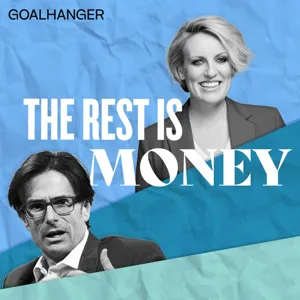Podcast Summary
Labour Party's Rachel Reeves Pushes for Economic Security with 'Securonomics': Rachel Reeves proposed a plan focusing on fiscal discipline, supply side reforms, and no large tax cuts or spending for economic security.
At the Labour Party conference, Rachel Reeves, who could potentially be the first female chancellor, emphasized economic security with her "Securonomics" plan. She focused on strict fiscal discipline, with no plans for large tax cuts or spending, instead relying on supply side reforms like infrastructure and planning improvements for growth. Meanwhile, in the business world, Beyond Meat's stock value has plummeted, and there's concern about Metro Bank's financial troubles and their implications for other banks. Additionally, there have been horrifying events in Israel with significant global ramifications, which will be discussed further in future episodes.
Importance of financial stability before economic policies: Rachel Reeves emphasizes the need for financial stability before implementing economic policies due to high borrowing costs and a challenging economic landscape.
Rachel Reeves was clear in her speech about the importance of restoring financial stability before implementing economic policies, contrasting it with the approach of Liz Truss's government. Reeves acknowledged the challenge of high borrowing costs for the next Labour government, emphasizing the need to prioritize financial stability to ensure economic growth. This focus on financial stability is a departure from the recent past, where governments have borrowed heavily to fund tax cuts without proper funding. The economic environment now is vastly different from when Labour last came to power, with lower growth rates and fewer assets to sell. Reeves, who could potentially be the UK's first female Chancellor of the Exchequer, will inherit a challenging economic landscape and will need to navigate it carefully.
UK Political Parties Face Challenges in Addressing Public's Concerns on Living Standards and Public Services: Both Conservatives and Labour parties are focusing on housing as a solution to economic challenges but lack specific plans to provide immediate relief and balance supply and demand.
During a discussion about the UK's economic situation and the upcoming election, it became clear that both the Conservative and Labour parties are facing challenges in addressing the public's concerns about living standards and public services. The Conservatives, led by the Chancellor, are focusing on long-term plans, such as increasing house building to boost growth, but these measures may not provide immediate relief. The Labour Party, on the other hand, is promising "jam tomorrow" rather than "jam today," with plans for affordable housing and interventionist policies, but lacking in specific details. The need for more housing is evident, with the UK building around 230,000 new homes last year, and Labour aiming for 1,500,000 in five years, which would be a significant increase but still not enough to balance supply and demand. The success of these plans will depend on the ability of governments to impose requirements on developers and navigate planning constraints in a free market. Ultimately, both parties will need to provide more details and concrete plans to address the public's concerns and restore confidence in their ability to improve living standards.
Plant-based food industry's challenge with ultra-processing and chemicals: Despite growing demand, plant-based food companies face backlash for ultra-processing and misrepresentation of protein content, negatively impacting consumer trust and health.
The plant-based food industry, which has seen growing demand due to health and sustainability concerns, faces challenges related to the ultra-processing and addition of chemicals in many products. Companies like Beyond Meat, which aim to create meat alternatives that look, taste, and cook like real meat, have faced backlash from investors and consumers due to misrepresentation of protein content and health concerns. The ultra-processing of these products can lead to chronic illnesses and negatively impact gut health. The example of Beyond Meat's struggles serves as a reminder of the importance of transparency and accuracy in labeling and marketing for companies in the plant-based food industry.
Plant-based food companies face challenges on multiple fronts: Health concerns and higher prices are leading to decreased sales for plant-based food companies. Environmental arguments are also facing scrutiny, and lab-grown meat could offer a more sustainable and ethical alternative.
Plant-based food companies are facing challenges on multiple fronts. The health concerns surrounding the ultra-processed nature of these products have led to a decrease in the belief that they are healthy among consumers. This, coupled with the fact that these alternatives are often more expensive than their animal counterparts, has resulted in falling sales and delayed public listings for companies like Beyond Meat and Impossible Foods. Additionally, the environmental argument for plant-based foods, which relies on the fact that meat production contributes significantly to greenhouse gas emissions, is also facing scrutiny due to the water and land requirements for growing plants used in these alternatives. Companies are now trying to market their products based on areas where they have an edge over meat, such as ethical concerns and environmental sustainability. However, even these arguments are not without controversy, as the production of plant-based alternatives also has environmental impacts. One promising development is the emergence of lab-grown or cultivated meat, which could offer a more sustainable and ethical alternative to traditional meat production.
Cultivated meat industry making strides towards market entry: Cultivated meat industry is advancing with market entry, addressing land and environment concerns, and facing intense industrial espionage. Metro Bank, a UK Challenger Bank, was saved from financial ruin by a Colombian billionaire, Heiber Galinski Bacow, raising over £300 million.
The cultivated meat industry is making significant strides towards market entry, with examples already available in Singapore and the FDA's recent approval of cultivated chicken in the US. This development could potentially address land and environment issues associated with traditional meat production. Additionally, there is intense industrial espionage surrounding this emerging industry due to its potential for being a huge market. On a different note, Metro Bank, a UK Challenger Bank with around 2.5-3 million customers and £15 billion worth of deposits, has been saved from financial ruin by a Colombian billionaire, Heiber Galinski Bacow. This rescue involved raising over £300 million, with Bacow investing £102 million and gaining a 53% share in the business. Metro Bank, founded in 2010, was the first high street bank to be granted a license in the UK in 150 years and was known for its innovative approach to banking, including long branch hours and accessibility.
Metro Bank's Quick Service and Community Focus Masked Financial Risks: Metro Bank's focus on customer service and community failed to address underlying issues with risk assessment and capital management, leading to a crisis in 2019. Regulatory oversight is crucial to protect depositors' funds.
Metro Bank's fast customer service and community focus, as well as its charismatic leader Vernon Hill, masked underlying issues with the bank's financial risk assessments and capital reserves. The bank's internal model for assessing the riskiness of its loans was deemed insufficient by regulators, leading to a capital crisis in 2019. This crisis caused anxiety for depositors, but the bank was able to raise the necessary capital and has since been declared safe by the Bank of England. However, the closure of bank branches in the UK raises questions about the long-term viability of Metro Bank's branch-focused business model. Despite its strengths, the bank's missteps in risk assessment and capital management highlight the importance of regulatory oversight in protecting depositors' funds.
Metro Bank's Plan to Expand Physical Branches: Metro Bank aims to open more branches, offering more than banking services to attract customers and revitalize high streets, but faces challenges due to high costs and digital competition.
While digital banks are gaining popularity with their efficient and often superior services, there is still a segment of the population, particularly older individuals, who prefer face-to-face banking at physical branches. Metro Bank, which has primarily operated in the southern part of the UK and has plans to expand to more cities, is considering opening more branches despite the high costs associated with them. The potential success of this strategy hinges on Metro Bank's ability to offer more than just banking services at these branches and make them experiential hubs that cater to the needs of their customers and contribute positively to the revitalization of struggling high streets. However, the business risk of opening expensive branches in an increasingly digital world remains a challenge.
Discussion on the potential impact of Labour Party's tax policy on private schools and state education: The Labour Party's proposed tax policy on private schools could result in around 40,000 students transitioning to state schools, but it may also lead to increased charitable donations and assisted places in private schools. Argentina's use of borrowed Chinese money through a swap line agreement with China was also discussed.
The Labour Party's proposed policy to tax private schools' VAT and business rates has sparked questions about the potential impact on state schools and the number of students who may transition from private to state education. Paul Malyon asked if anyone has modeled the number of children who would leave private schools and require state places versus the available state school capacity. The Independent Schools Council estimates that this policy could force around 40,000 students out of private schools, but some argue that this could lead to more charitable donations and assisted places in private schools. Argentina's use of borrowed Chinese money to pay off IMF debt through a swap line agreement was also discussed, with Jamie Hill asking for clarification on the term "swap line." A swap line is an agreement between two central banks to exchange currencies temporarily, allowing a country to stabilize its economy or receive support.
Argentina's economic struggles and China's role: Argentina's debt crisis highlights the fragmented global economy and the lack of coordination among major powers, increasing the risk of instability and potential crises.
Argentina's economic struggles have led it to seek financial assistance from China, which is being used to repay IMF debt and pay for imports. This power play between China and the IMF highlights the fragmented nature of global power and the lack of coordination in addressing global economic issues. Argentina's inability to repay its debts poses a significant risk to the global economy, emphasizing the interconnectedness of financial systems worldwide. The IMF's leniency towards Argentina could be due to geopolitical considerations, as it aims to prevent Argentina from falling too much under China's influence. The global economy is increasingly divided into different power blocs, with China, Russia, America, and Europe each wielding significant influence. The lack of global coordination in addressing these issues could lead to instability and potential crises.





